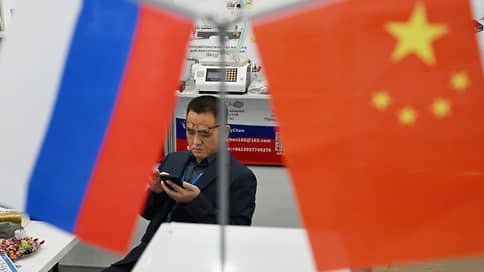How Russian companies are suing counterparties from China

In the context of the reorientation of the Russian economy, the number of transactions concluded with Chinese counterparties, as a result, increases the number of disputes on them. “Kommersant” talked with lawyers about where the business is being addressed to resolve disputes under Russian-Chinese contracts. According to experts, Chinese arbitration centers are more likely to choose; In addition, they also appeal to Russian arbitration courts, and the State Courts of the PRC and the Russian Federation go less often. The nature of the dispute, the amount of claims and the possibility of forced execution of decisions, also affect the choice of jurisdiction.
In general, the parties to the Russian-Chinese contracts are trying not to bring the case to the court, but to resolve disputes through negotiations, said Alexander Molotnikov, chairman of the board of the Russian-Chinese Law Society. The partner and head of the Far Eastern office of the Pepelyaev Group’s legal act, Natalya School, confirms this, clarifying that “the Chinese mentality traditionally negatively refers to the judicial resolution of disputes”. In this regard, in many cases, it is possible to resolve the dispute in a non -judicial basis, adds Valery Lazeta, managing partner of the Avlan, Avlan.
Arbitration or state court
When it comes to court, the parties are facing the question of the place of proceedings and the institute of resolution of the dispute. At the same time, most experts surveyed say that business mainly chooses not state courts, but commercial arbitration. Alexander Molotnikov explains this by « the comparative speed of the consideration of disputes and a simpler and more predictable process of execution of decisions. » The advantages of arbitration are also confidentiality, the possibility of choosing an arbitrator and the execution of decisions in 172 countries participating in the 1958 New York Convention.
Advisor to the practice of intellectual property of the Law Firm EBR Kristina Mkrtchyan confirms that the choice of state courts in the Russian Federation or China is less common. According to the observations of Valery Lazeobny, the appeal to the State Courts of the PRC occurs in about 5–7% of cases, usually when the jurisdiction of the dispute is not regulated by the contract.
If the parties choose international commercial arbitration, then the Russian sides, as a rule, are offered by domestic centers, and Chinese institutions – institutions in their country, says Ilya Rachkov’s partner, AB NSP.
Most lawyers say that the most often disputes are transferred to Chinese arbitrations.
Natalya Schoolchana distinguishes the top 5 of arbitration institutions in the mainland of China: the Chinese International Economic and Trade Arbitration Commission (CIETAC), the Beijing Arbitration Commission (BAC), the Shanghai International Arbitration Center (ShIAC), the Shanzhen International Arbitration Court and the Guangzhou Arbitration Commission (GAC). Separately, experts call the Hong Kong International Arbitration Center (HKIAC) as a platform in demand and understandable to both sides.
There are reservations on Russian arbitration. According to Anastasia Simonova, senior lawyer Verba Legal, “Chinese counterparties are quite positive about Russian arbitration institutions, in particular, they often choose the ICAC under the CCI of the Russian Federation, focusing on the reputation of the oldest arbitration center.” Ilya Rachkov also calls the Russian arbitration center for rice and the arbitration center at the RSPP among the sites that are also in demand on such disputes. As neutral jurisdiction, the parties sometimes choose arbitration in Singapore and Stockholm.
244.8 billion dollars
The turnover has reached between China and Russia in 2024, according to the Customs of the PRC.
Under the contract and the court
Igor Mazilin, managing partner of INGVARR ZHONG YIN, emphasizes that « the choice of jurisdiction and form of dispute resolution is determined primarily by the nature of the contract, its value, as well as the distribution of commercial and legal risks. » He believes that « when choosing jurisdiction, it is important to take into account not so much the convenience of legal proceedings in their own jurisdiction, but the speed and realism of the execution of the decision. » That is, much will depend on who will be the defendant.
Often, the price of the issue also affects the choice of jurisdiction, says Alexander Kostin, founder of legal practice K-Legal (prepares expert conclusions for foreign and Russian courts). According to his observations, the “significant part of the controversy of the“ average ”size between Russian and Chinese entrepreneurs is considered by international commercial arbitrations (arbitration place – Russia), as well as Russian state offices.” The largest things, he clarifies, can be transferred to centers in Hong Kong, Malaysia and Singapore.
Kristina Mkrtchyan adds to factors affecting the choice, impartiality and neutrality of the site and the effectiveness of the process. FTL Advisers partner Maria Doll notes that when choosing a place of consideration of the dispute, “the parties focus on the usual legal system, language, procedural predictability and minimizing the risks of the influence of the other side on the process.” Natalya Schoolchana emphasizes that the choice depends on the « position and negotiation power of the party in the transaction. »
National features
The head of the Vegas Lex International Projects Natalia Abtseshko draws attention to the presence of a legal assistance agreement between Russia and China in 1992, which allows us to recognize and fulfill the decisions of the state offices of each country in the territory of another. But there are few positive examples of recognition in the PRC of the decisions of the State Courts of the Russian Federation, says Valery Lazetny, including because the bilateral agreement does not cover all categories of disputes, for example, does not apply to intellectual property, bankruptcy, taxes, family disputes. The managing partner of AB Nordic Star in Russia Anna Rubrotskaya among problems notes “the specifics of applicable regulation in China” and says that it is easier to achieve the execution of Russian arbitration in the PRC than the Russian State Court. In addition, Ilya Rachkov and Natalia Abtseshko indicate the difficulties of notifying the Chinese defendants about the dispute conducted in the Russian State Court. Alexander Kostin clarifies that Russia and China made a reservation to Art. 10 of the Gaga Convention of 1965, according to which it is impossible to notify the side by mail, and « in the order of international legal assistance, the notification does not always reach the addressee. » Meanwhile, an improper notification entails the abolition of the decision.
Among the advantages of arbitration in China, Igor Mazilin identifies its relative accessibility and the execution of his decisions in Russia. According to him, a simplified procedure for the execution of internal arbitration solutions ensures the speed and predictability of the process. The Head of the Practice of the Chinese Law of the KKMP legal act, the referee of the Arbitration Commission of Zhengzhou Chuck Peng also notes criminal liability in the PRC for the dishonest conduct of the arbitration process. The rules of the Chinese centers correspond to the latest trends, including funding for disputes by the third party and online-gathering, Anastasia Simonova points out. At the same time, most lawyers say that cases of bias in foreigners in Chinese arbitration are quite rare and mainly only in small centers and provincial cities.
Among the shortcomings of the arbitration in the PRC, Maria Doll notes « the need to attract Chinese lawyers, limited access to foreign lawyers to participate in the process and the risk of applying Chinese law in an opaque interpretation. » In addition, Alexander Kostin points out, unless otherwise established in the agreement, then the trial in Chinese arbitration centers is conducted in Chinese, which may make it difficult to find the referee and communication with the secretariat. According to him, it is important to take into account the « Features of the mentality of Chinese colleagues and the culture of communication. » “In connection with bureaucratic procedures, there is a risk of delaying both the trials themselves and the execution of court decisions,” warns Alexander Molotnikov.








